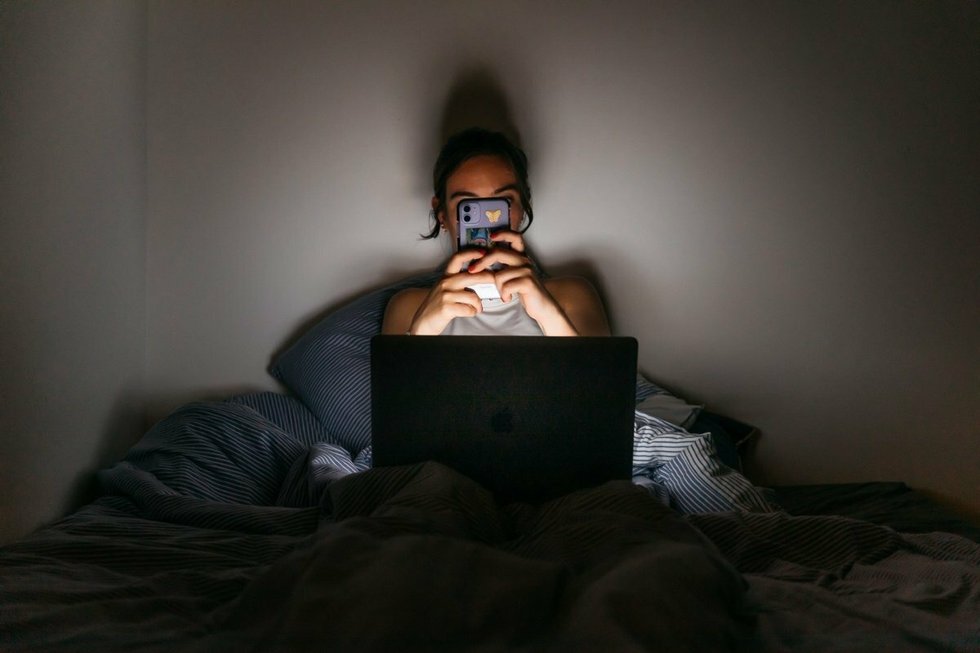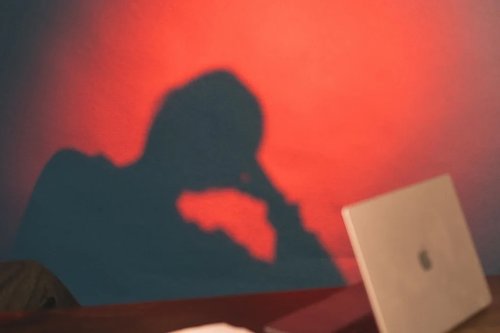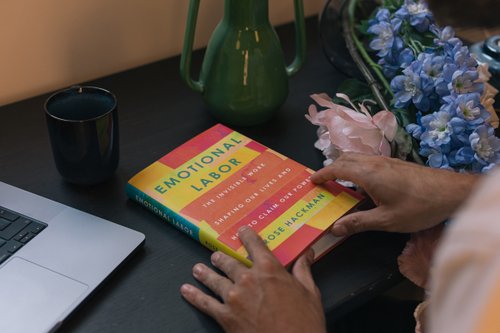Do you suffer from hyperconnection? Take this test from a digital detox expert
Dec 20, 2021
5 mins


Journaliste - Welcome to the Jungle
Haven’t we all binged a Netflix series in a few days, answered work emails in bed, or checked Instagram in the middle of the night at some point in our lives? While screens have become our new teddy bears, they punctuate our daily lives with bursts of blue light, making it increasingly difficult to set limits or imagine going just a few hours without them. This is perhaps even more true since nearly the whole world started working from home, blurring the lines between professional and personal use of our tech toys.
Unfortunately for us, digital consumption comes with consequences, and the more screens we have access to, the more health risks we are exposed to. From stress to trouble sleeping, vision problems, and cardiovascular disease, too much screen time affects both our bodies and our minds. It is also believed to be at the root of a new evil called hyperconnection, in other words the excessive use of digital technology in all its forms. But if everyone uses screens all the time, how do you know whether you are addicted? Thierry Le Fur is an expert in digital and addictive behaviors, and facilitator of “digital detox” workshops for those working from home. Here he gives us some tips to help us to measure our addiction levels, and some ideas that could finally help us to quit.
1. The first thing you do when you wake up is:
A - Stretch, meditate, take a shower and take care of yourself
C - Check your phone or computer from bed
B - Have a coffee, absently turn on a screen such as a TV or smartphone
2. Your day starts. The notifications on your phone are:
C - All on, and you check them every five minutes
B - Partially activated and you check them every 30 minutes
A - Often deactivated. You take a glance about once an hour
3. How do you feel about offline coffee or well-being breaks eg moving, breathing, laughing etc?:
A - You like them. In fact, you have established a well-being routine and consciously disregard your smartphone during these breaks
C - Not really your thing: must stay connected
B - You try to take short breaks when your schedule allows it
4. You must respond to an ‘urgent’ request:
B - You are tempted to reply by email, but you often try to delay doing so
C - You deal with it immediately
A - You go to see your colleague (if they are close) or you call them
5. At work, you communicate:
C - Day and night
A - Between 9 am and 6 pm
B - Sometimes you answer an email/text outside of “working” hours
6. During the lockdowns your workspace was mainly:
A - A room or a dedicated place devoted solely to work
C - A computer or smartphone that you move between the bed and the living room
B - A mix of bed, living room, and workspace/home office
7. On public transport:
C - You scroll on your phone, always on alert
A - You log off: time to enjoy the landscape, some peace, or a good book
B - It depends on the day
8. When you watch a movie:
B - You keep an eye on your phone or tablet
A - You are focused on the plot
C - You answer texts, network, surf, play, etc
9. On weekends and during holidays:
A - You enjoy spending time with friends, in nature
C - You spend a good amount of time working
B - You check your emails and sometimes answer them
10. When you go on vacation, your destination:
C - Must have a GOOD wi-fi connection
A - Can be off-grid, no problem
B - Can be “disconnected”, but with a wi-fi zone close by
Results
You got mostly A’s: You manage to control your consumption, or may even be a digital hermit
Le Fur’s analysis: In this hyperconnected world, it seems that you are a champion of digital balance! You know how to take the time to disconnect and you have no trouble doing so.
Expert advice: If you only have A’s: you’re actually practicing what’s known as the art of digital asceticism. In this case, I have just one recommendation for you: repeat the test every now and then to check that your “digital doses” are not increasing. Are one or two B’s or C’s popping up in your final result? Take the opportunity to turn them into a challenge. When you’re working from home, do your breaks include screen time? Replace them with short walks around your neighborhood to clear your mind. Are you moving enough? Try the 10,000 steps per day challenge. Your smartphone can count them for you. Are you being called upon outside of your office hours? Better to wait until the next day and limit the use of social networks so as not to be tempted to respond.
You got mostly B’s: You are a little too connected
Le Fur’s analysis: As you are a bit too connected, opt for a light “digital detox” strategy. Be careful not to tackle all of the issues at the same time and go cold turkey: the deprivation may be too great and the defeat even more depressing.
Advice from the expert: Start with little wins. For example, plan a nice breakfast for the next day, which doesn’t include working from your bed. Do breathing exercises between several intensive uses of the screen at the office or at home, find a couple of friends to do a non-digital activity with. But also, start putting your phone on airplane mode at least an hour before going asleep to avoid any risk of professional intrusion that would disrupt your sleep. Your strategy will be easier to start and will last longer if it is based on small efforts dotted here and there. Now take a sheet of paper to jot down any enjoyable rituals that come to mind. These notes will serve as a basis for you to draw on when the time comes.
You got mostly C’s: You suffer from hyperconnection!
Le Fur’s analysis: Your screens and smartphones are always on and within reach. Your digital bubble might be too comfortable, but what’s behind this over-the-top behavior? Several hyperconnected profiles fall into this category. The most frequent are the “digital refuge” (your screen protects you from the hostility of the real world); the “digital power” (your control tower allows you to control and/or command); and the “digital pleasure” (your digital life is fun and exciting). In any case, you need to rebalance your screen consumption.
The expert’s advice: To avoid using your phone as a “digital refuge”, take advantage of coffee breaks to meet up with your colleagues and go out and get some fresh air during lunchtime. Does the “digital power” profile sound like you? Pick up your phone, but this time to set up informal meetings. As for “digital pleasure” profiles, say yes to all the opportunities for outings that sound good to you and use them to meet new people.
At work, sprinkle your days with pleasant rituals that are soothing (meditation, stretching, etc) or stimulating (laughing, games, coffee breaks, etc) to enjoy life offline and thus protect your body from a sedentary lifestyle. Outside of working hours, take back control of your life. It is important to understand the idea that you should not be connected everywhere and at all times in your life. Digital objects can quickly become addictive and make you forget everything you liked to do before they came into your life. Try to rediscover what and who you like in life, and your efforts will be rewarded with good times.
NB: This is not a science-based assessment. It was designed by Thierry Le Fur, an expert in digital and addictive behaviors, and specialist in health issues, and quality of life at work, to raise awareness about hyperconnection in the world of work.
Translateds by Kim Cunningham
Photo by Welcome to the Jungle
Follow Welcome to the Jungle on Facebook on LinkedIn and on Instagram and subscribe to our newsletter to get our latest articles every day!

More inspiration: Mental health

‘We need each other’: Monika Jiang on combating loneliness in hybrid work
Hybrid work offers flexibility but can leave us feeling disconnected. Monika Jiang explores how we can rebuild workplace connections.
Dec 19, 2024

Struggling at work? Here are 3 steps to rebuilding your self-esteem
Low on confidence? Learn how reflection, recharging, and refocusing can help you rebuild self-esteem and thrive professionally.
Nov 27, 2024

10 ways to beat the Sunday Scaries
Even people who love their jobs can experience the Sunday Scaries. Psychologist Karen Doll offers several strategies to help manage and overcome it.
Sep 12, 2024

Unpacking the burden of emotional labor
Rose Hackman’s "Emotional Labor" reveals how managing emotions impacts everyone, especially women and minorities.
Aug 08, 2024

Is financial anxiety harming your productivity?
Feeling overwhelmed by financial anxiety? You're not alone. Discover practical steps and expert advice to regain control of your work-life balance.
Jul 31, 2024
The newsletter that does the job
Want to keep up with the latest articles? Twice a week you can receive stories, jobs, and tips in your inbox.

Looking for your next job?
Over 200,000 people have found a job with Welcome to the Jungle.
Explore jobs